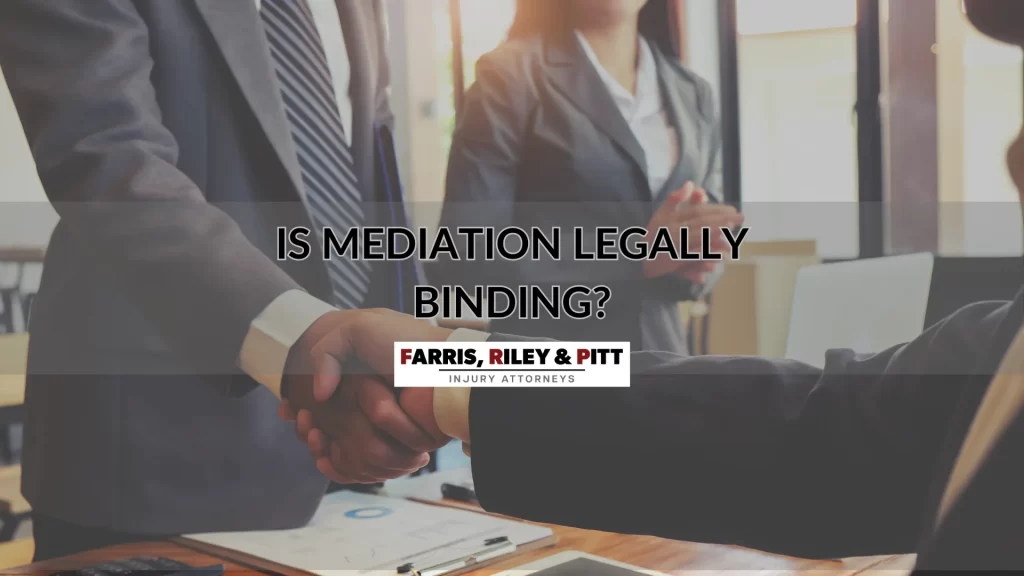Posted on Tuesday, November 1st, 2022 at 5:51 pm

Mediation allows personal injury plaintiffs to arrive at a fair outcome quickly and at less cost than taking their case to trial. Unlike a judge or jury verdict, mediation is not legally binding, and both sides have equal control to determine a final outcome. Today, we’ll clear some misconceptions about mediation, demystify how it works, and help you decide whether it may be worth considering.
Where Mediation Stands in the Process
Mediation is a series of guided negotiation sessions between you, your lawyer, an insurance defense team, and an impartial mediator. The mediator’s goal is to identify any gridlock between the parties and attempt to bring them to an amicable resolution.
Before a case enters mediation, each side may have participated in direct negotiations with the other, but to no avail. Other times, a court may order the parties to enter mediation. Most commonly, however, both sides will agree to enter mediation before the plaintiff files a lawsuit or during the pretrial phases of a pending lawsuit.
How Mediation Works
While minor specifics of the mediation process may vary from agency to agency, each mediation has several standard processes and characteristics in common. They include:
- Both sides agree on a mediator – Mediators are often retired lawyers or judges from both legal teams’ shared network. Both sides must agree to the specific mediator.
- Both sides are in separate spaces – While the lawyers may sometimes give opening arguments in a joint session, everything after that session will occur in different rooms. The mediator will circulate between your legal team’s and defense’s rooms to relay offers and give advice.
- Mediation can take time – A defense lawyer may need to obtain permission from their supervisor before accepting a settlement offer. While this may add time to the mediation process, it is still much faster than a trial.
- Mediation is confidential – Everything you say in mediation sessions is confidential. A defense attorney cannot use what you say against you in court. However, they may still investigate new information they learn in the mediation. Your lawyer will advise you on what not to say before the mediation begins.
Mediation versus Arbitration
Mediation and arbitration are both forms of alternative dispute resolution, and depending on the case, either option could have many of the same practical benefits. However, they have completely different processes and completely different goals.
Arbitration is led by one or more third-party “arbiters.” Usually, arbiters will represent a prominent national organization, such as the American Arbitration Association (AAA,) that designs procedures and handles the logistics of the case. An arbiter will hear both sides’ arguments in a fashion similar to a trial, then weigh the facts to determine the best possible resolution.
Where mediation is not legally binding, arbitration can be binding. Business defendants may prefer binding arbitration over mediation for its shorter duration and to protect them from paying a costlier amount after trial.
The parties may also agree to enter “non-binding” arbitration. If either side is dissatisfied with the arbiter’s suggested resolution, they still reserve the option to pursue other forms of dispute resolution or take the case to trial.
Does Mediation Mean “Settlement?”
 While mediation might be a valuable tool for a quick resolution in your case, we cannot guarantee that you’ll leave mediation with a signed settlement agreement. Scenarios where mediation may end without a settlement include:
While mediation might be a valuable tool for a quick resolution in your case, we cannot guarantee that you’ll leave mediation with a signed settlement agreement. Scenarios where mediation may end without a settlement include:
- Both sides agree to it – If the parties mutually determine that a mediator is not helping them reach a resolution, they may choose a different mediator, consider arbitration, or let the lawsuit proceed to trial.
- Factual challenges – If one side strongly disagrees with the other side’s version of the case, they may not believe mediation to be worth their time, instead choosing to weigh the facts at a trial.
- Consistent lowballing – The other party to a mediation may consistently make offers well below the amount you seek. In this situation, your lawyer may decide you would have better odds through other tools.
Even if mediation results in an impasse, remember that there are still other potential avenues for success. Since mediation is not binding, both sides may also choose to re-enter it at any time, perhaps with a different mediator. This is particularly true as your legal team discovers new evidence or the lawsuit approaches trial.
Consult with a Birmingham, AL, Personal Injury Mediation Attorney
The Birmingham personal injury lawyers of Farris, Riley & Pitt, LLP can answer your questions about the mediation process and represent you faithfully in pretrial negotiations. For a free consultation, contact our legal team at (205) 324-1212 today.















